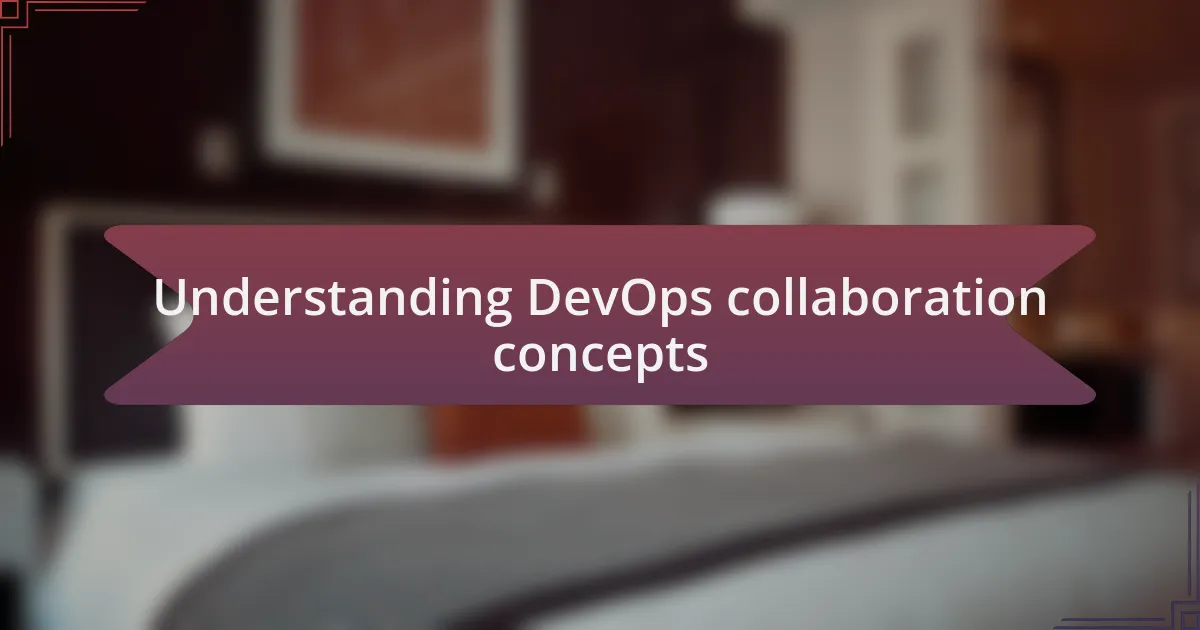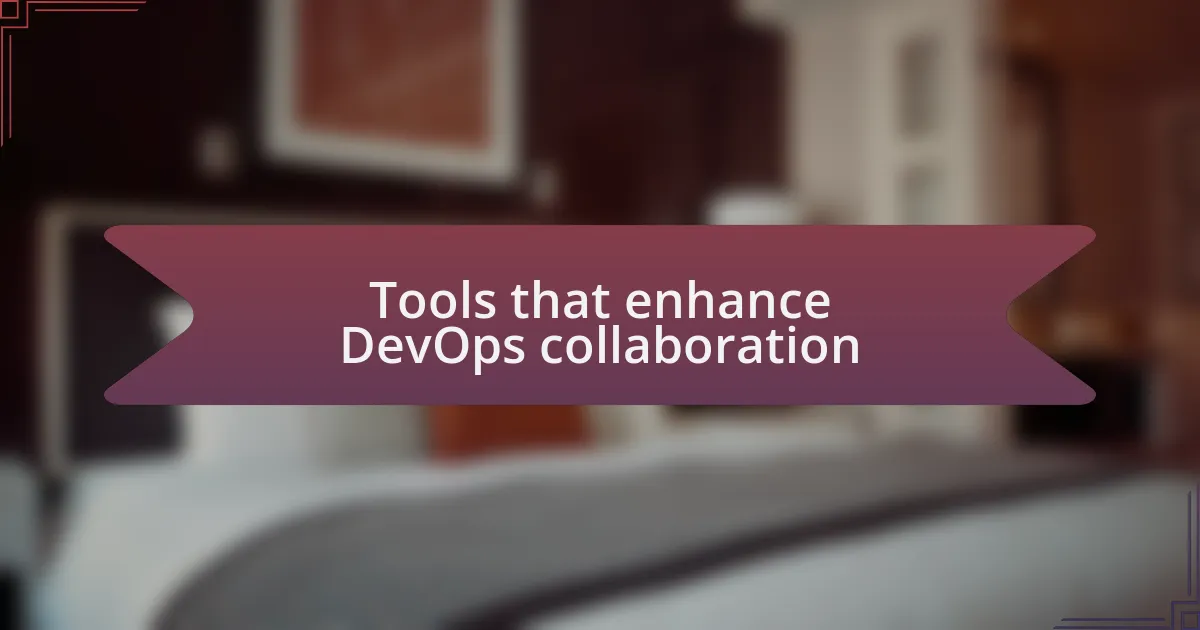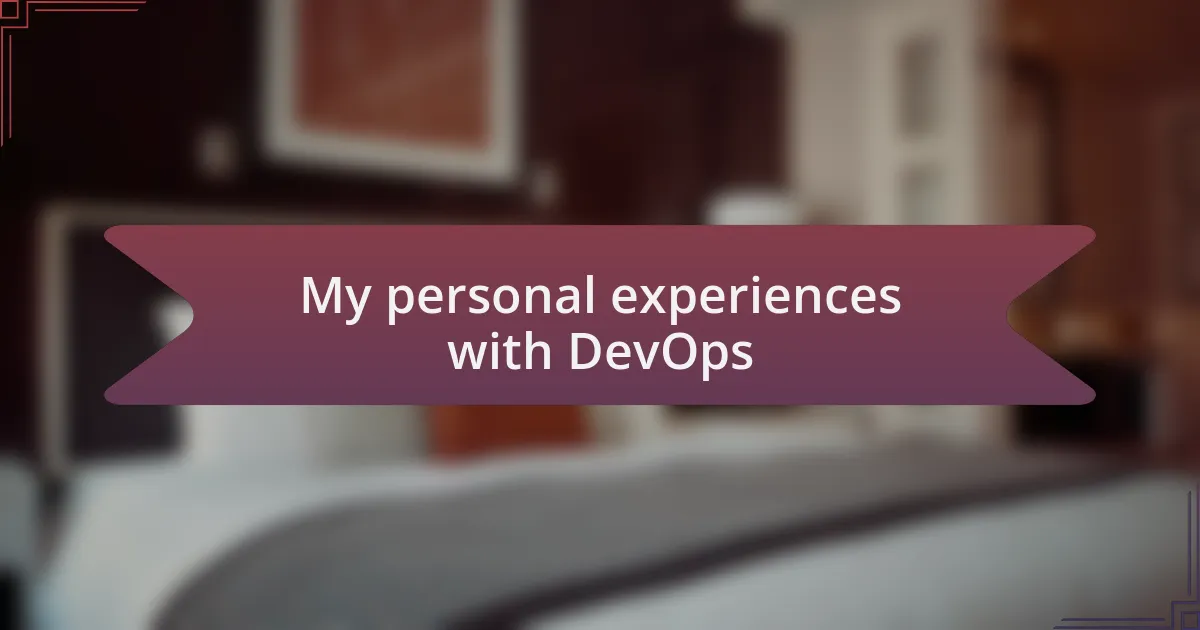Key takeaways:
- Collaboration in DevOps thrives on continuous feedback, fostering trust and investment among team members.
- Implementing CI/CD pipelines enhances the speed and reliability of feature releases, encouraging teams to deliver value rapidly.
- Tools like Slack and Jira improve communication and task management, reducing misunderstandings and promoting transparency.
- Facing challenges such as differing team cultures and miscommunication highlights the need for empathy and clear communication in DevOps teamwork.

Understanding DevOps collaboration concepts
Collaboration in DevOps revolves around the seamless interaction between development and operations teams, creating a culture of shared responsibility. From my experience, it’s fascinating to see how breaking down silos can lead to innovative solutions. Have you ever noticed how when teams communicate effectively, the end product often reflects a blend of perspectives that can elevate it?
One concept that often strikes me is the idea of “continuous feedback.” This process encourages team members to share their insights continuously, rather than waiting for a retrospective meeting. I recall a project where early and frequent feedback changed our workflow dramatically. It fostered trust among team members and made everyone feel more invested in the outcome, truly embodying the essence of collaboration.
Furthermore, embracing tools that facilitate communication and automation can significantly enhance this collaborative spirit. I’ve found that platforms like Slack or Jira can keep everyone on the same page, reducing misunderstandings. Can you imagine how much smoother projects could run if everyone had immediate access to vital information?

Key principles of effective DevOps
One key principle of effective DevOps is fostering a culture of empathy within teams. When I first joined a cross-functional project, I was surprised by how much understanding between developers and operations improved our outcomes. It made me wonder, what if we prioritized understanding each other’s challenges more consciously? This small shift can lead to greater collaboration and a shared goal that transcends departmental boundaries.
Another crucial element is the practice of continuous integration and delivery (CI/CD). I’ve seen firsthand how implementing CI/CD pipelines can drastically reduce the time between writing code and deploying it to production. It was exhilarating to witness a team release features multiple times a day, knowing the speed was balanced with reliability. Why wouldn’t we want to empower teams to deliver value quickly while ensuring high quality?
Lastly, measuring success through shared metrics brings everyone onto the same playing field. In one of my previous roles, we adopted a system where both development and operations were evaluated based on user satisfaction and performance metrics. I realized that these shared goals shifted our focus, creating a unified purpose that everyone rallied around. It made me ponder how interconnected our successes really are when we focus on what matters most: the end-user experience.

Tools that enhance DevOps collaboration
When it comes to tools that enhance DevOps collaboration, Slack has been a game-changer for my teams. The ability to create dedicated channels for specific projects or topics allowed us to communicate openly and share insights in real time. I’ll never forget how a simple suggestion shared in a Slack channel led to a major breakthrough in our deployment strategy, saving us weeks of work. How often do we overlook the power of instant communication in driving progress?
Another essential tool is Jira, which helps in managing tasks across teams. I remember when we started using Jira for sprint planning; it was like shining a light on our workflow. The transparency it provided made it easier to spot bottlenecks and celebrate our successes together. It made me question how we ever managed projects without such clear visibility.
GitHub is also vital for collaboration, allowing us to work simultaneously on code without stepping on each other’s toes. In my experience, the pull request feature fosters discussions that lead to better code quality. I recall a particularly challenging feature where diverse perspectives from team members helped us refine our approach, demonstrating the power of collective intelligence. Isn’t it fascinating how the right tools can unlock creativity and innovation?

My personal experiences with DevOps
One of my earliest experiences with DevOps was during a critical project where we had to implement continuous integration. I vividly remember the initial chaos of integrating various tools; there were moments of frustration, but then there was this exhilarating sense of accomplishment when we finally automated our testing pipeline. It made me realize how much trust and collaboration were vital; we were no longer siloed, but rather a cohesive unit working towards a shared goal.
Late nights spent troubleshooting deployments often turned into the most rewarding moments for me. There was one night when our team rallied together to fix a last-minute issue before a major release. The adrenaline and camaraderie during those hours were unforgettable. Who would’ve thought that some of the best memories I’d cherish would come from a pressure cooker situation, built on our shared commitment to deliver quality?
Looking back, it’s clear that effective communication played a pivotal role in our success. I remember how powerful it felt when team members openly shared their thoughts during retrospectives. Those candid exchanges not only fostered improvement but also deepened our bond as a team. Have you ever experienced that moment when a simple conversation propels you towards a solution? It’s those moments that truly highlight the value of collaboration in DevOps.

Challenges faced in DevOps teamwork
One significant challenge I encountered in DevOps teamwork was navigating the differences in team cultures. In one project, our development team had a fast-paced approach, while the operations folks were more methodical and cautious. I remember feeling the tension during our meetings, as both sides struggled to find common ground. Have you ever felt caught between two different ways of working? It’s tough, but it taught me the importance of empathy and understanding perspectives to foster a collaborative environment.
Another hurdle we faced was the sheer complexity of the tools we used. One time, I was tasked with deploying a new monitoring solution while simultaneously coordinating with multiple teams. The confusion over which tool to use and how to set it up felt overwhelming. I found myself wishing for a centralized resource to ease that burden, as it often felt like we were each navigating through our own isolated knowledge. What if a shared knowledge base could bridge those gaps? Addressing these complexities can lead to smoother interactions in the long run.
Lastly, it’s impossible to ignore the impact of miscommunication when working under tight deadlines. In one instance, an unclear message about the timeline led to misaligned priorities between development and operations. The frustration was palpable, and I could see how quickly morale dipped when team members felt unsupported. These experiences highlighted for me how vital it is to cultivate a culture of clarity and openness. How do we keep the lines of communication open when pressures mount? It’s an ongoing learning journey that shapes our approach to teamwork.